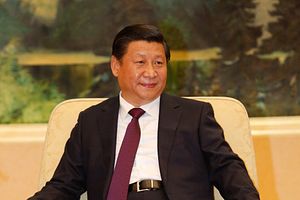From a podium overlooking Tiananmen Square, Chinese President Xi Jinping, prior to a military parade commemorating the 70th anniversary of Japan’s surrender in China, delivered a speech filled with harsh anti-Japanese rhetoric vicariously targeting the current Japanese government under Prime Minister Shinzo Abe.
“The Chinese People’s War of Resistance Against Japanese Aggression and the World Anti-Fascist War were a decisive battle between justice and evil, between light and darkness, and between progress and reaction,” Xi emphatically noted.
Xi also spoke of the great contribution that China made in defeating fascism by confronting Japan for 14 long years in the 1930s and 1940s:
In that devastating war, the Chinese People’s War of Resistance Against Japanese Aggression started the earliest and lasted the longest. In defiance of aggression, the unyielding Chinese people fought gallantly and finally won total victory against the Japanese militarist aggressors, thus preserving China’s 5,000-year-old civilization and upholding the cause of peace of mankind.
He continued:
This great triumph crushed the plot of the Japanese militarists to colonize and enslave China and put an end to China’s national humiliation of suffering successive defeats at the hands of foreign aggressors in modern times.
While noting that China “will never inflict its past suffering on any other nation,” he cautioned that the “war is the sword of Damocles that still hangs over mankind.”
Japan’s reaction to the speech was predictable. According to Japanese government spokesman Yoshihide Suga, “Tokyo had requested that Beijing make sure that the event was not so anti-Japanese, but instead contain elements of rapprochement between Japan and China.” However, “it was disappointing that such elements were not in President Xi Jinping’s speech today.”
Japan had previously also criticized the attendance of U.N. General-Secretary Ban Ki-moon’s at today’s military parade, calling it “disappointing” while demanding that “that the United Nations keep a neutral position,” according to Channel News Asia.
Ban rejected this criticism by stating that “China’s contribution and sacrifice during the Second World War is very much recognized, [and China] is appreciated for all such sufferings, and sympathized [with] by the world’s people,” the Guardian reported.
Referring to the announced cuts of 300,000 troops of the People’s Liberation Army (See: “Here’s What You Need to Know About China’s Grand Military Parade”), Suga said that Japan hopes that “the reduction in troops… will be done with a high level of clarity.”

































